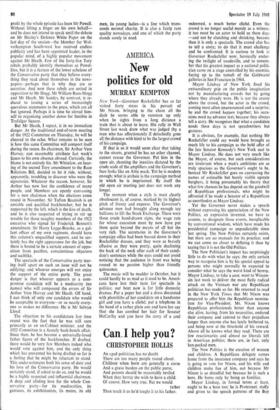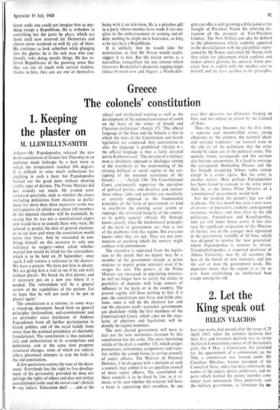New politics for old
AMERICA MURRAY SEMPTON
New York—Governor Rockefeller has so far visited forty states in his pursuit of Mr Nixon, bringing to the chase all the dash he seems able to summon up only when he sights from a long distance a train that is about to leave. His rally in Wall Street last week drew what was judged (by a man who has affectionately if detachedly gone all the distance with him) to be the largest crowd of his campaign.
If that is so it would seem clear that taking to the streets, granted he has no other channel, cannot rescue the Governor. Put him in the open air, shouting the inanities dictated by the crude scale of the amplifiers and the Governor's face looks like an Attic mask. Yet he is modern enough; what is archaic is the campaign method in which he is imprisoned. By itself the old open air meeting just does not work any longer.
The moment when a style is most clearly obsolescent is, of course, marked by its highest pitch of frenzy and expense. The Governor's advance men had brought along enough toy balloons to lift the Stock Exchange. There were those crude hand-drawn signs, the wage rate for whose execution must by now have put them quite beyond the means of all but the very rich. The secretaries in the Governor's campaign office had been bussed down in their Rockefeller dresses, and they were as bravely effusive as they were pretty, quite deafening the back of the neck after each of their candi- date's sentences while the eyes could not avoid noticing that the audience in front was being roused to no passion higher than friendly quiescence.
The music will be madder in October, but it could hardly be as mad as it used to be. Ameri- cans have lost their taste for spectacle in politics; our bent now is for little domestic dramas. Put a paper hat and a dress decorated with photoliths of her candidate on a handsome girl and you have a cliché; put a telephone in the hand of a rather plain one and have her say that she has combed her hair for Senator McCarthy and you have the story of a soul redeemed, a much better cliché. Even the crowd is no longer useful merely as a witness; it too must be an actor to hold us these days —and not by clutching and shrieking, because then it is only a spectacle. The crowd also has to tell a story; to do that it must challenge and be confronted. It is curious to look at Governor Rockefeller now, heroically endur- ing the twilight of vaudeville, and to remem- ber that his greatest impact as a national politi- cian came on a stage controlled by his enemies, facing up to the tumult of the Goldwater galleries in San Francisco in 1964.
Mayor Lindsay of New York fixed his extraordinary grip on the public imagination not by manufacturing crowds but by going where they already were. He is not the orator above the crowd, but the actor in the crowd, coming most often unannounced and a surprise; he and the crowd happen together; his occa- sions need no advance text, because they always tell a story. He recognises that what a candidate needs these days is not speechwriters but gestures.
It is obvious, for example, that nothing Mr Rockefeller could say would have brought as much life to his campaign as the bold offer of the late Senator Kennedy's New York seat to Mayor Lindsay. He does not • very much like the Mayor, of course, but such considerations are irrelevant when a man's ambitions are as truly spacious as the Governor's ought to be. Instead Mr Rockefeller goes on canvassing the names of estimable but barely visible upstate burghers, it being presumably his theory that what few chances he has depend on the goodwill of Republican professionals, who might be affronted if he made a Senator of a Republican as unorthodox as Mayor Lindsay.
Yet the Governor never makes a speech without expressing his appreciation of the New Politics, an expression invented, we have to assume, to designate those events, inexplicable by conventional wisdom, which have made his presidential campaign so unpredictable since last spring. The New Politics certainly exists, but there are no manuals for its practice; and we can come no closer to defining it than by saying that it is not the Old Politics.
The New Politician's impact has surprisingly little to do with what he says; the only certain way to recognise him is by his special appeal to persons who might normally be expected to consider what he says the worst kind of heresy. Mayor Lindsay, to take a case, went to Wiscon- sin last week to -deliver the most flatly radical attack on the Vietnam war any Republican politician has made so far. He returned to read in the New York Times that Mr Nixon was prepared to offer him the Republican nomina- tion for Vice-President. Mr. Nixon knows Republican professionals better than anyone else alive, having, from his necessities, endured their company and catered to their prejudices longer than anyone else has lately bothered to, and being now at the threshold of his reward. Above all he knows what they read. There are few reactionaries and almost no liberals left in American politics; there are, in fact, only hen-pecked men.
The New Politics is the creation of women and children. A Republican delegate comes home from the insurance company and says he is going to vote for Nixon, and his wife and children make fun of him, not because Mr Nixon is so dreadful but because he is such a bore. He bores only by being so familiar.
Mayor Lindsay, in formal terms at least, ought to be a bore too; he is Protestant, stuffy and given to the speech patterns of the Boy Scout oath; one could not imagine him as any- thing except a Republican. He is orthodox in everything but the parts he plays, which are those until now reserved for Democrats and almost never rendered so well by any of them. He continues to look suburban while plunging into the ghetto; he is the safe man who con- tinually risks doing unsafe things. He has re- lieved Republicans of the gnawing sense that they are out of touch with current fashion; thanks to him, they can see one of themselves
being with it on television. He is a priceless gift to a party whose enemies have made it too sen- sitive to the embarrassment of seeming out-of- date; nothing he might do is heterodox, so long as he says he is a Republican.
It is unlikely that he would take the nomination, or that Mr Nixon would readily suggest it to him. But the notion serves as a marvellous tranquilliser for any 'stresses which Governor Rockefeller's desperate tugging might induce between now and August; a Nixon dele-
gate can offer a wife growing a little jaded at the thought of President Nixon the relieving dis- traction of the prospect of Vice-President Lindsay. The New Politics can also be defined as the phenomenon which suddenly appeared in the dissatisfaction with the old politics repre- sented by Mr Nixon, and which Mr Nixon, with that talent for adjustment which explains and makes almost glorious his survival, knew pre- cisely how to exploit with the smallest cost to himself and the least sacrifice to his principles.







































 Previous page
Previous page